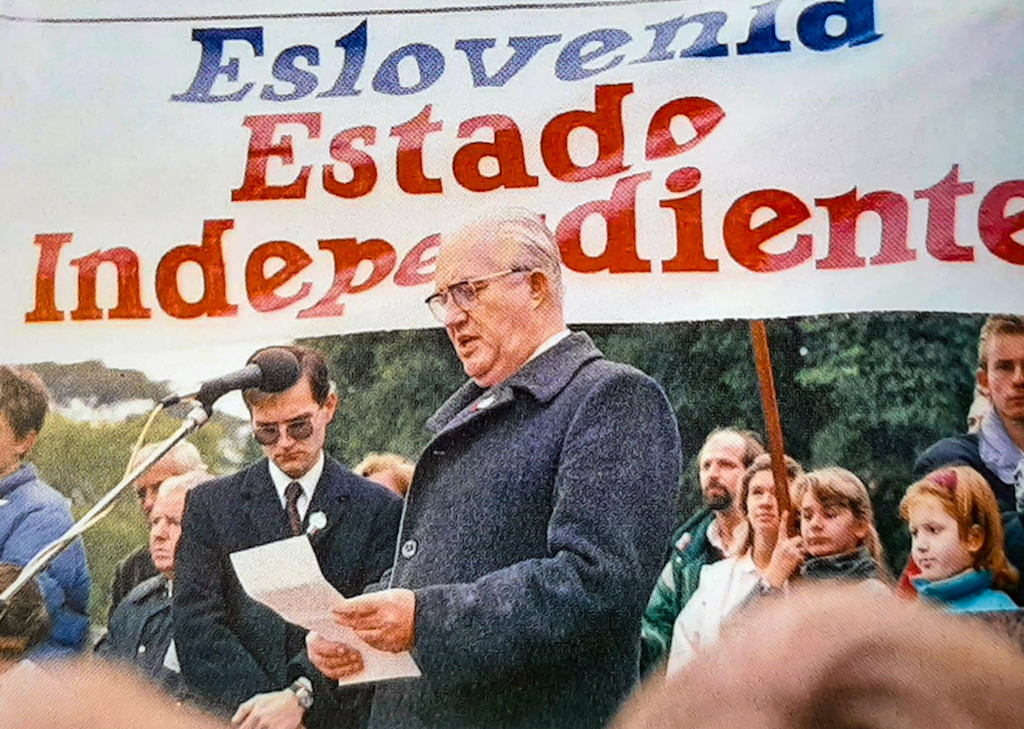By: Lucija Kavčič
30 years ago, Slovenian emigrants from all over the world and Slovenians living abroad contributed greatly to the independence of the Republic of Slovenia and its international recognition, through their influence and prayers. For this, the Republic of Slovenia remains grateful to them.
Then, in June 1991, letters of support for the then Slovenian government came from Slovenians from all over the world. Slovenians living abroad also sent hundreds of letters to governments and presidents of countries around the world with requests for international recognition of the Republic of Slovenia. Certainly, it was the mighty support of compatriots in diaspora that contributed to the rapid recognition of our country; after all, they were the ones who developed and planned the creation of an independent Slovenia – even at a time when this idea was persecuted in the homeland.
The work of patriots
When the independence processes in Slovenia began, Slovenians around the world moved and took action. In the following lines, only some of our compatriots will be mentioned, who in 1991 advocated and intervened for the fastest possible international recognition of the Republic of Slovenia, but we must emphasise that the role of all others is no less important. The Argentine, Slovenian France Dolinar (1915–1983), a historian and priest who did not live to see an independent Slovenia, thought about an independent Slovene state at least 40 years earlier. He wrote that “the first condition for the existence and development of the nation-state of Slovenia must be that we are a structurally strong and united nation”, which was realised 30 years ago; however, an international recognition had to be achieved as well.
In 1991, Slovenians living abroad organised protests for the international recognition of the Republic of Slovenia.
Professor Dr. Edi Gobec (1926–2020), among others, the founder and director of the Slovenian-American Research Center in Cleveland in the USA, wrote and sent hundreds of letters between 1990 and 1992 to American politicians as well as governments and embassies of other countries from Sweden, Iceland and Great Britain to Australia and Japan. On 12 July 1991, he gave a high-profile speech at an All-American Convention of Young Republicans in Miami, Florida, in which he presented reasons why Slovenia deserved its independent state to delegates and present politicians, diplomats, and journalists. He managed to convince the participants, so that they greeted independent Slovenia with a long and standing ovation. The engine of the promotion of independent Slovenia in the USA was the radio representative of the United Americans for Slovenia initiative, Tony Petkovšek, and Dr. Jože Bernik (1924–2011) continued his efforts for an independent Slovenia by running for the president of Slovenia in 1997 and being a member of the National Assembly of the Republic of Slovenia from 2000 to 2004.

Support from all ends
A special Holy Mass for the Homeland was given on 1 July 1991 in the Church of the Immaculate Conception with a miraculous shrine in Toronto by the Bishop of Toronto, Dr. Alojzij Ambrožič (1930−2011). In his address to two thousand participants, he emphasised that Slovenia’s independence should be supported by the entire world, and he also arranged the statement by the Canadian and American Bishops’ Conference in support of Slovenia’s independence. Dorothy Lenarčič and Stane Kranjc were also very active in Toronto, working on the international recognition of the Republic of Slovenia. At the other end of the world, in Australia, Cvetko Falež (1931−2020), through his persistent intervention in the Australian government, helped to speed up the recognition of the independent Republic of Slovenia. The Honorary Consul General of the Republic of Slovenia in New South Wales in Australia, entrepreneur Alfred Brežnik, and members of the Slovenian National Councils and the Australian Slovenian Conference, also made a significant contribution to this with their influence among representatives of the Australian Government. In Sweden, demonstrations for the international recognition of the Republic of Slovenia were tirelessly organised by Milan Starc; in addition, he wrote articles about Slovenia’s independence for Swedish newspapers, lobbied the Swedish authorities, and reported on the events in Slovenia on Swedish television and radio shows. One of the most important ambassadors of Slovenian culture in the world is Evgen Bavčar, who informed journalists at the time of independence and held great merits for France and many other European countries for recognising Slovenia.
Thirty years on
Slovenians living abroad, such as the Carinthian Slovenian Karel Smolle, the president of the Carinthian Unified List at the time of independence, contributed greatly to the international recognition of the Republic of Slovenia. Many descendants of Slovenians were only able to visit the homeland of their ancestors after independence, but certainly most of them still know where they were in June 1991 and what they did in support of the recognition of the new state. They are proud that Slovenians have our own country that is internationally successful in many areas, said Helena Jaklitsch, the current Minister for Slovenes Living Abroad, about the international recognition of the Republic of Slovenia for deserving Slovenians living abroad. She concluded with the idea that the positive effects of an independent state are especially noticeable abroad, while political emigration is above all, the result of the disappointment mainly due to an unfinished transition.

